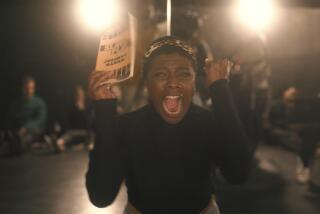‘Fierce Love’ a Black View of Gay Life
SAN DIEGO — Blaine and Antoine, the effeminate film critics featured on Fox’s “In Living Colour,” are quite possibly the two most visible gay black males in America today.
But as the San Francisco-based theater troupe Pomo Afro Homos reminds us, finger-snapping Blaine and Antoine are not real. They’re fictional characters. Stereotypes.
Tonight, Pomo Afro Homos (short for post-modern, African-American homosexuals) opens its self-written “Fierce Love: Stories From Black Gay Life” for a run through Saturday at Sushi Gallery. According to Pomo Afro Homos co-writer and director Brian Freeman, the three-man show “talks very frankly about sex, about AIDS, about religion and about black issues” from a distinctly gay black male perspective.
Not coincidentally, the second vignette in the 12-scene, 75-minute show is a pointed send-up of Blaine and Antoine.
“Some people see those two black, snapping guys and think, ‘OK. Now I know everything about being black and gay,’ ” the soft-spoken and articulate Freeman said. “We throw that image right out onto the table and say, ‘Is this it? Is this really it?’ ”
Pomo Afro Homos say no, this is not it.
“The Blaine and Antoine bit is a good ice-breaker because people know those characters,” Freeman said. “People laugh at those characters, but then we challenge the audience to keep listening. We deconstruct this notion that black gay men are in the world for the entertainment of every body else.”
Deconstruction began last November, when Freeman, a performance artist who spent eight years with the San Francisco Mime Troupe, dreamed up “Fierce Love.”
“I was talking to the manager of Josie’s Cabaret, a San Francisco club which presents many gay and lesbian events,” Freeman said. “I told him I wanted to do a show about being black and gay. He said ‘Do it.’ I told him I hadn’t written the show yet, and he said, ‘You will.’ ”
Freeman then called fellow performers Djola B. Branner and Eric Gupton. The three met at a San Francisco cafe and began talking about what they could put in a show.
“After an hour, we had literally filled the page with story ideas,” Freeman said.
“Fierce Love,” starring Freeman, Branner and Gupton, opened at Josie’s Cabaret on Jan. 25 and has since toured the country.
“The response to the first performance was overwhelming,” Freeman said. “We thought we’d have 40, maybe 50 people in the house. We wound up turning that many away. That type of response has never stopped.”
For Freeman, simply generating responses is reason enough to stage “Fierce Love.” “There’s not a lot of discussion about gay issues in the black community,” he said. “There’s not a lot of discussion about race issues in the gay community.”
Pomo Afro Homos is initiating some dialogue.
John Guinn, a health educator with the San Diego Urban League and a member of Lesbians and Gays of African-American Descent United, was impressed with Pomo Afro Homos’ ability to address race/sexuality issues.
“I saw a portion of “Fierce Love” in February at the Black Gay and Lesbian Leadership Conference in Los Angeles,” Guinn said. “This show really increases one’s awareness of the plight of the gay black male.”
According to Guinn, the black gay community is sharply divided between vocal, pro-active individuals and the “weekend partiers,” who live a gay lifestyle but hesitate to speak out for their concerns. Fear of discrimination, Guinn suggests, breeds the silence.
“Being black, you’re already up against societal barriers in dealing with racism,” Guinn said. “Being black and gay only adds to the discrimination.”
Despite the specific nature of the piece, Guinn added that “Fierce Love” transcends the black gay male experience. “You forget that the story is a black gay male story,” he said. “It has universal themes.”
Freeman agrees.
“Everyone has felt excluded from something at some point,” he said, “either because of who they are or what they feel or what they do. The separate vignettes really raise the general issue of exclusion.”
“Sad Young Man” is about a man who grows up with a strong, modern black identity, but a frustrated sense of gay identity. “Silently into the Night” addresses the problems that arise when a gay lover dies. “The Just Us Club” examines avoiding black gay stereotypes--everything from the silent, strapping object of desire to the squealing, shrieking sissy.
“In a way, this show has served notice to the larger white gay community,” Freeman said. “We’re here. We’re here, and we’re more than just objects of desire or humor or whatever.”
Despite his involvement and concern for black-and-gay issues, Freeman isn’t the type to start preaching.
“When you talk about ‘issue theater,’ audiences tend to think, ‘Oh no. They’re going to complain and whine and make me feel bad for an hour.’ That’s not what we’re all about,” Freeman said.
“Some artists get very hot about whatever issue it is they’re addressing and forget that they’re putting on a show. We were careful to take out anything that sounded too didactic. For us, making the show entertaining was the bottom line. Whatever we have to say, we’ll say, but the most important thing was making the show work as a piece of theater.”
One person who thought the show worked was George C. Wolfe, resident director of the Public Theater in New York City.
Wolfe, author of the popular race-issue drama “The Colored Museum,” saw “Fierce Love” in New York and subsequently invited Pomo Afro Homos to develop and premiere its next show at the Public Theater, one of the most-respected non-Broadway theaters in New York.
The as-of-yet-untitled follow-up to “Fierce Love” is scheduled to open in December.
“We’ll be starting our next show at one of the biggest theaters in the country,” Freeman said.
Despite the rapid and quite unexpected rise, Freeman doesn’t consider the Pomo Afro Homos tale a rags-to-riches story. Not yet.
“I haven’t seen any riches yet,” he said with a laugh.
Pomo Afro Homos’ “Fierce Love: Stories From Black Gay Life” opens at 8 p.m. today and runs through Saturday at Sushi Gallery, 852 8th Ave., downtown. 235-8466.
More to Read
The biggest entertainment stories
Get our big stories about Hollywood, film, television, music, arts, culture and more right in your inbox as soon as they publish.
You may occasionally receive promotional content from the Los Angeles Times.










